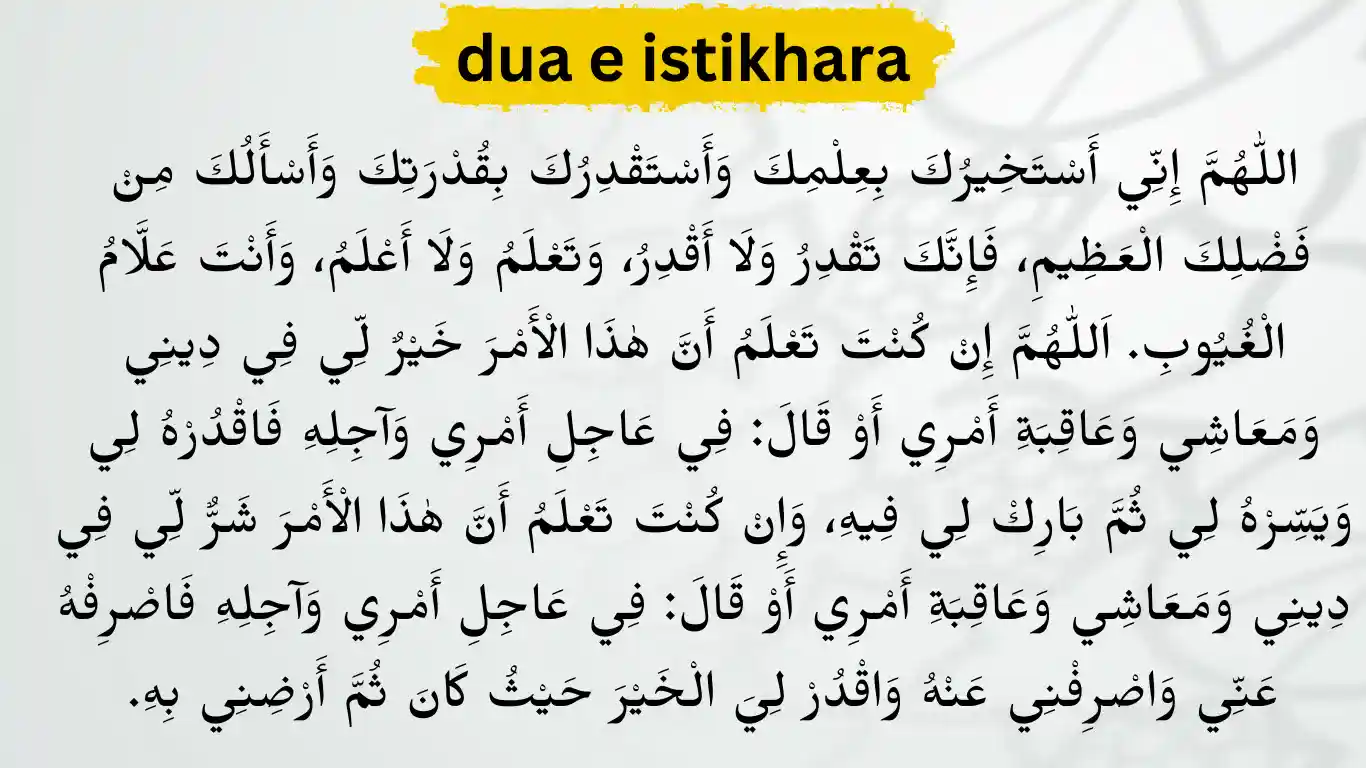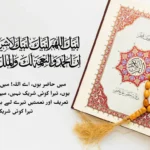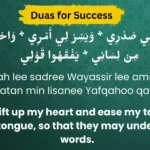Dua e Istikhara is a profound prayer for divine guidance, taught by Prophet Muhammad (PBUH), that helps Muslims seek Allah’s wisdom when faced with decisions. Whether choosing a career, deciding on marriage, or resolving life’s uncertainties, Istikhara invites Allah’s help to determine the best course of action. This article offers a detailed breakdown of the Dua e Istikhara, its translation, meaning, and practical implementation.
| Powerful Dua for Forgiveness- Seek Allah’s Mercy |
| Ayat e Kareema: Benefits of Ayat e Kareema |
| Allahu Latifun Bi ibadihi Yarzuqu Man Yasha’u |
| Darood e Taj: Powerful Verses You Need to Know |
Dua e Istikhara in Arabic, Transliteration, and Translation
Arabic Text:
اللّٰهُمَّ إِنِّي أَسْتَخِيرُكَ بِعِلْمِكَ وَأَسْتَقْدِرُكَ بِقُدْرَتِكَ وَأَسْأَلُكَ مِنْ فَضْلِكَ الْعَظِيمِ، فَإِنَّكَ تَقْدِرُ وَلَا أَقْدِرُ، وَتَعْلَمُ وَلَا أَعْلَمُ، وَأَنْتَ عَلَّامُ الْغُيُوبِ. اَللّٰهُمَّ إِنْ كُنْتَ تَعْلَمُ أَنَّ هٰذَا الْأَمْرَ خَيْرٌ لِّي فِي دِينِي وَمَعَاشِي وَعَاقِبَةِ أَمْرِي أَوْ قَالَ: فِي عَاجِلِ أَمْرِي وَآجِلِهِ فَاقْدُرْهُ لِي وَيَسِّرْهُ لِي ثُمَّ بَارِكْ لِي فِيهِ، وَإِنْ كُنْتَ تَعْلَمُ أَنَّ هٰذَا الْأَمْرَ شَرٌّ لِّي فِي دِينِي وَمَعَاشِي وَعَاقِبَةِ أَمْرِي أَوْ قَالَ: فِي عَاجِلِ أَمْرِي وَآجِلِهِ فَاصْرِفْهُ عَنِّي وَاصْرِفْنِي عَنْهُ وَاقْدُرْ لِيَ الْخَيْرَ حَيْثُ كَانَ ثُمَّ أَرْضِنِي بِهِ
Transliteration:
Allahumma inni astakheeruka bi ilmika, wa astaqdiruka bi qudratika, wa as’aluka min fadhlikal azeem, fa innaka taqdiru wala aqdiru, wa ta’lamu wala a’lamu, wa anta allaamul ghuyoob. Allahumma in kunta ta’lamu anna haazal amra khayrun li fi deeni wa ma’aashi wa aaqibati amri, wa aajili amri wa aajilihi faqdurhu li wa yassirhu li, thumma baarik li fihi. Wa in kunta ta’lamu anna haazal amra sharrun li fi deeni wa ma’aashi wa aaqibati amri, wa aajili amri wa aajilihi fasrifhu anni wasrifni anhu, waqdur liya alkhayra haythu kaana thumma ardini bihi.
English Translation:
“O Allah, I seek Your guidance through Your knowledge and seek ability through Your power, and I ask You of Your great bounty. You have power, I have none. You know, and I know not. You are the Knower of hidden things. O Allah, if You know that this matter is good for my religion, my livelihood, and the outcome of my affairs (or in my present and future), ordain it for me, make it easy for me, and bless it for me. But if You know this matter to be bad for my religion, my livelihood, and the outcome of my affairs (or in my present and future), turn it away from me and turn me away from it, and ordain for me what is good wherever it may be, and make me pleased with it.”
Urdu Translation:
“اے اللہ! میں تیرے علم کے وسیلے سے تجھ سے ہدایت کا طلب گار ہوں، اور تیری قدرت کے ذریعے تجھ سے طاقت مانگتا ہوں، اور تیرے عظیم فضل کا سوال کرتا ہوں۔ تجھے طاقت حاصل ہے، مجھے نہیں۔ تجھے علم ہے، مجھے نہیں۔ تو تمام پوشیدہ باتوں کا جاننے والا ہے۔ اے اللہ! اگر تیرے علم میں یہ معاملہ میرے دین، میری روزی، اور میرے انجام کے لحاظ سے بہتر ہے، تو اسے میرے لیے مقرر فرما، اسے میرے لیے آسان بنا، اور اس میں برکت عطا فرما۔ اور اگر تیرے علم میں یہ معاملہ میرے دین، میری روزی، اور میرے انجام کے لحاظ سے نقصان دہ ہے، تو اسے مجھ سے دور کر دے، اور مجھے اس سے دور کر دے، اور میرے لیے جہاں بھی خیر ہو، اسے میرے لیے مقرر فرما، اور مجھے اس پر راضی کر دے۔”
Explanation of Dua e Istikhara
The Dua e Istikhara is divided into key parts, each with profound meanings and insights. Below is a detailed explanation:
1. Seeking Allah’s Knowledge and Power
“O Allah, I seek Your guidance through Your knowledge and seek ability through Your power…”
In this opening, we acknowledge that Allah is the ultimate source of knowledge and power. As humans, our knowledge is limited, and we turn to Allah, the All-Knowing, to guide us in making the best decisions.
2. Recognizing Our Limitations
“You have power, I have none. And You know, I know not.”
This part humbles the believer, reminding us of our dependency on Allah’s divine wisdom. It helps us place complete trust in His decisions, which are always best for us.
3. Request for Blessings
“If You know this matter to be good for my religion, my livelihood, and my Hereafter, ordain it for me, make it easy for me, and bless it for me.”
This segment emphasizes our hope that Allah’s guidance leads to ease, success, and blessings, not only in this life but also in the Hereafter.
4. Seeking Protection from Harm
“If You know this matter to be bad for my religion, my livelihood, and my Hereafter, turn it away from me and turn me away from it.”
Here, the believer entrusts Allah to protect them from harm, showing complete submission to His wisdom.
5. Contentment with Allah’s Will
“Ordain for me what is good wherever it may be, and make me pleased with it.”
The concluding part stresses acceptance of Allah’s decision, regardless of the outcome, fostering contentment and peace in the believer’s heart.
Practical Steps to Perform Istikhara
- Perform Wudu (Ablution): Ensure you are clean before offering the prayer.
- Pray Two Rakats of Salah: Begin with two non-obligatory units of prayer with sincerity.
- Recite the Dua e Istikhara: After completing the prayer, recite the supplication mentioned above with full focus.
- Make Your Intention Clear: While reciting, keep the matter you are seeking guidance for in mind.
- Trust in Allah’s Decision: After performing Istikhara, trust that whatever happens is Allah’s choice for you.
FAQs:
Recite it whenever you face a significant decision and need Allah’s guidance, such as for marriage, a job, or major life changes.
Yes, you can make the intention for someone else’s guidance and recite the Dua on their behalf.
Istikhara is not solely about seeing dreams or signs. It’s about trusting that Allah will guide your heart and decision toward what is best.
This prayer reminds us that seeking Allah’s guidance is the ultimate way to achieve clarity, success, and peace in our lives. May Allah guide us all to the best decisions. Ameen.




